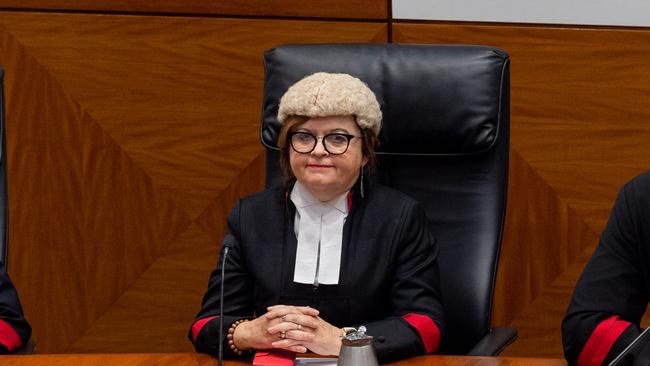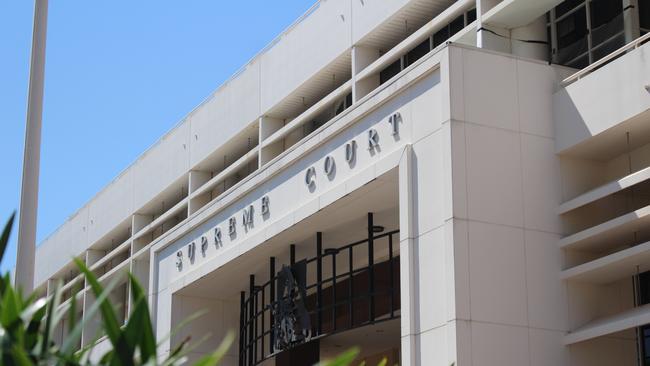NT Health attempt to appeal Supreme Court decision which freed Darwin mum after 10 years in prison without a charge
A Darwin mum who was never found guilty of a crime has spent 10 years in prison. But nine months after gaining her freedom, she says an NT Health legal challenge will condemn her to die in a cell.

Police & Courts
Don't miss out on the headlines from Police & Courts. Followed categories will be added to My News.
A Darwin mother who has spent 10 years locked up despite never being convicted of a crime says a push by the NT Health Department will condemn her to die in a cell.
Nine month ago the Indigenous woman, known to the courts as KMD, was freed from her Holtze cell after spending 10 years it it due to her mental health condition.
She suffered a schizophrenic episode in May 2013, where she kidnapped her ex’s mother, drove to her child’s school and fired a gun six times.
Believing her child was in grave danger, KMD fired the weapon at her ex-partner, narrowly missing his head, before shooting his mother in the arm.
When he tried to drive away with the help of a bystander, KMD gave chase, firing and ramming the vehicle as they tried to escape.
Her lawyers argued she was not mentally fit to make a plea — a decision which meant those six gunshots condemned her to a term of indefinite detention as a “Part IIa” prisoner.

In June 2023 Justice Sonia Brownhill revoked the Custodial Supervision Order, allowing KMD to walk free.
But on Thursday the Department of Health appeared in a Supreme Court in a bid to appeal that decision and give the chief executive control of the Darwin mother’s medical autonomy.
NT Health’s barrister Ian Read said Justice Brownhill failed to assess the risk posed by KMD, as her order did not compel her to take antipsychotic or mood stabilising medication or impose mandatory meetings with psychologists.
Mr Read described KMD as a “plainly highly intelligent, impressive, dignified” woman, who had no history of violence for her decade-long imprisonment.
He conceded in KMD’s nine month of freedom there was no evidence her mental health had deteriorated and she had “essentially complied with the orders”.
Yet he still argued the Darwin mum’s risk was so severe NT Health should have the power to compel her to take medication and meet mental health professionals.
KMD’s barrister Emrys Nekvapil said her “belief system” meant such an order would mean she would be “held in custody until she dies”.
Mr Nekvapil said after being a prisoner for 10 years, KMD felt the doctors she trusted were using therapeutic sessions to enable “forcible medication or another year of loss of liberty”.
Mr Nekvapil said that relationship was so damaged KMD was unwilling to take medication or see a psychiatrist — even if that meant going back in a cell indefinitely.
Mr Nekvapil said expert evidence stated “forcible medication is counter-productive”.
He said Justice Brownhill correctly balanced the “stalemate” between KMD’s liberty and public risk by placing her in the care of her “support team” — her mother, aunt, a social worker, her GP, with a case manager from Top End Mental Health Service picked by the NT Health chief executive.
Mr Read argued KMD’s family were not trained professionals who would not pick up signs of deterioration, but Mr Nekvapil said they had the advantage of daily contact, trust, and close personal relationships.
“(They) are motivated by the desire to avoid any repeats of the original offending,” Mr Nekvapil said.
“They could and most likely would notice if KMD is expressing beliefs again.”
Mr Read said while there was a low likelihood of KMD reoffending, any flare-up could pose a high risk.

He compared it to parole for a person with alcohol-related offences, who usually had conditions on their drinking.
Justice Jenny Blokland pointed out it was likely her distrust of doctors was also likely “part and parcel with the illness itself”.
Both sides acknowledged the “tragedy” of the legal dilemma ultimately boiled down to a lack of appropriate mental health services.
“As a matter of law, she is not a criminal — yet she has been held in prison for many years because there is no therapeutic present facility in the Northern Territory,” Mr Read said.
There are currently 13 “Part IIa-ers” Territorians serving indefinite sentences in prison without ever having been found guilty of a crime, according to the Australian Bureau of Statistics.





